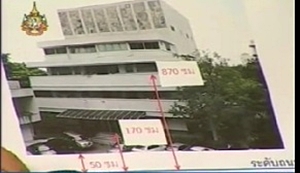BANGKOK, Nov 2 – The Thai government confirmed on Wednesday that there was neither radiation contamination nor chemical leaks at flood-ravaged premises and industrial estates.
Office of Atoms for Peace Secretary General Chaiwat Torsakulkaew and Thailand Institute of Nuclear Technology (TINT) Deputy Director Sirinat Lauharojanaphan jointly told a news conference at the government’s Flood Relief Operations Centre (FROC) that although floodwater has reached the Institute on Vibhavadi Rangsit Road, TINT has so far been spared flooding.

Test results showed no radiation contamination, the officials said.
Mr Chaiwat said the Institute, which operates a small nuclear reactor for research, has been well-protected.
Located on the third floor of the Institute, 8.70 metres above the ground, the nuclear reactor is surrounded by a one-metre thick concrete wall in a 240 cubic metre pool which could resist water pressure as great as one to two tonnes, Ms Sirinat said.
Additionally, the nuclear reactor has already been shut down, she said, so the public should be assured that there will be no danger of radiation contamination.
Meanwhile, the government’s Chemical Control Department tested water quality at the flooded industrial estates and parks in Ayutthaya and Pathum Thani and found no chemical contamination. Water quality remains intact, according to the department’s deputy director-general Worasart Apaipong.
Seven industrial estates and parks are now under water. Five are in Ayutthaya – the Ban Wa Hi-Tech, Saha Rattana Nakhon, Bang Pa-in, Rojana and Factoryland estates – while the other two – Nava Nakorn and Bangkadi – are in Pathum Thani province, north of Bangkok.
Mr Worasart said that the department staff found no chemical contamination in water around the industrial estates and parks except at Ban Wa Hi-Tech where an explosion occurred at a plastic factory.
He said that an oil slick was found and while chemical tanks were scattered around the factory site, tests showed that volatile organic compounds (VOCs) were only slightly higher than standard and had no effect on human health.
He said the test results came from 44 teams of technical specialists who examined and tested the water quality at 149 flooded locations.
According to the survey, he said, 46 per cent of the samples were found to have very poor quality while 25 per cent were of poor quality.
Fair quality was found in 13 per cent of the locations surveyed, but only 16 per cent were found to be of good quality, he said. (MCOT online news)




